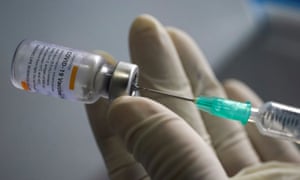Move raises questions as China’s vaccines not approved in many countries to which it is opening travel

A vial of the Chinese-made Sinovac coronavirus vaccine. Chinese vaccines have been approved for use in Hong Kong, the Philippines, Thailand and Iraq. Photograph: Athit Perawongmetha/Reuters
China is resuming visa processing for foreigners from dozens of countries, but only if they have been inoculated against Covid-19 with a Chinese-made vaccine.
The move has raised questions about the motivations behind the demand, given China’s vaccines are not approved in many of the countries to which it has opened travel and that it will not accept foreign vaccines made elsewhere, including those approved by the World Health Organization.
Beijing had largely banned non-essential travel into China during the pandemic. Resumption of travel is a key driver for economic recovery and many countries are discussing carefully negotiated bubbles, or mutually recognised vaccination passports, as they implement domestic vaccine rollouts.
The announcements made by Chinese embassies in about 20 countries this week vary slightly for each country but mostly pledge a return to pre-pandemic visa processing for some groups, so as to resume “people-to-people exchanges in an orderly manner”.
So far it is open to foreigners from places including Hong Kong, the US, the UK, India, Australia, Iraq, Thailand, Croatia, Israel, Pakistan and the Philippines. Any prospective entrants must have taken either the full two-dose course of a vaccine, or a single dose vaccine at least 14 days before travelling, but the vaccine must be one of China’s domestically produced shots. Negative Covid tests and quarantine rules still apply.
The statement issued by the embassy in the US said China would now allow the return of “foreign nationals and their family members visiting the mainland of China for resuming work and production in various fields”. It also broadened eligibility for non-emergent “humanitarian needs” travel, for family members of Chinese citizens or residents who want to visit for family reunions, care for elderly or ill relatives, or attend funerals.
China first announced changes to visa processes for foreigners in Hong Kong, where China’s Sinovac is one of the vaccines already being administered to the public. Chinese vaccines have also been approved for use in the Philippines, Thailand and Iraq, but in several other countries to which China has offered the travel option there is no Chinese vaccine available.
That meant people in Australia, for instance – who can only receive an approved vaccine, prescribed by a medical practitioner – were excluded from China’s offer by default.
Paul Griffin, an Australian-based infectious diseases physician, said it was possible Australian regulators would approve a Chinese vaccine eventually, “but I’m not aware they’re being reviewed by the TGA … and we certainly don’t have a purchasing agreement”.
After early criticism and suspicion over China’s lack of published trial data, there is much wider acceptance of Chinese vaccines now, although reported efficacy rates vary wildly. For vaccines across the board there a lot is still unknown about how well they block transmission, both in individuals and at a population level when more than one type is used.
In a press briefing on Tuesday, Zhao Lijian, the ministry of foreign affairs spokesperson, denied the rule was designed to push other countries to recognise China’s vaccines.
“Our proposal … is made after thoroughly considering the safety and efficacy of Chinese vaccines,” Zhao said. “This is an arrangement made by the Chinese side unilaterally. It is a different thing from vaccine recognition.”
Robert Booy, an infectious diseases and vaccine expert from the University of Sydney, said Beijing’s announcement was “a good sign” for people returning to China for work, and it made sense to want those returnees to be vaccinated.
“I think all countries, China or not, are proud of a safe and effective vaccine, and would be keen to see a quality vaccine widely used, so I’d take the politics out of this and say I understand wanting to see a safe and effective vaccine used.”
But the fact that Chinese-made vaccines were not available in many countries made things difficult. “I would hope the Chinese authorities would accept any reputable Covid vaccine,” Booy said.
